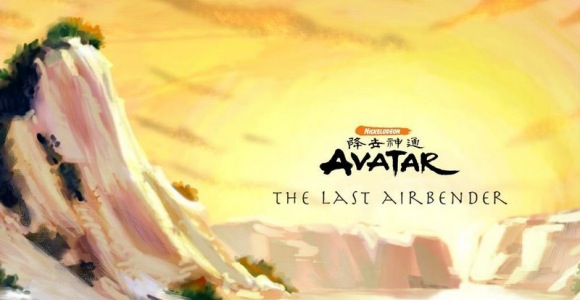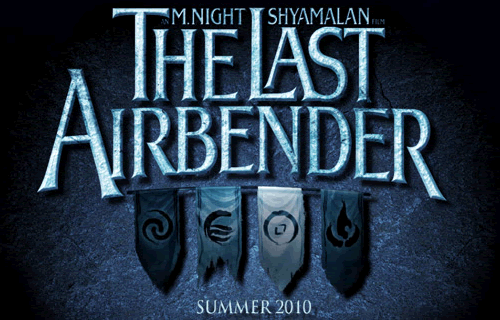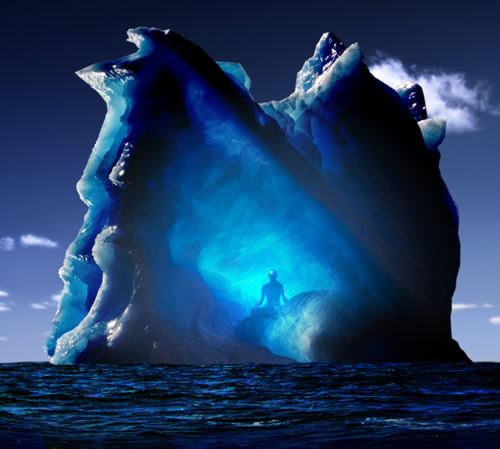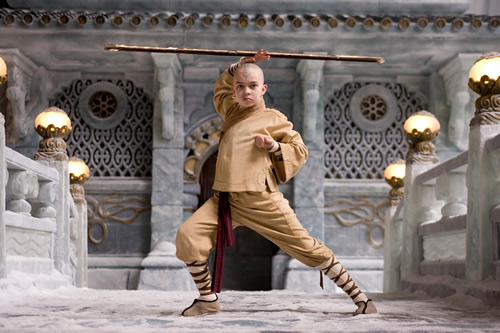The Last Airbender is an abomination to film making. It makes Matrix Revolutions look like The Godfather. Don’t go see it, tell your friends not to see it — don’t even wait until it comes out on DVD. Don’t waste a moment of your life on this film; you’ll thank me later.

I love Avatar
I am a huge fan of Avatar: The Last Airbender. When I was out of work for a few weeks in 2005, I happened to land on this Nickelodeon cartoon while channel surfing. The depth of the universe, the chemistry between the characters, and the fact that it had something for both kids and adults simply mesmerized me. I was astounded that the writing for an animated cartoon could be so good.
Over the next few years, I watched Aang, Katara, Sokka, Toph, Zuko, Ihro, Appa and little Momo grow together as a family, and saw Aang grow from being the boy in the iceberg to a fully-realized master of all four elements. The build-up to the finale kept me on the edge of my seat, and the final battle between Avatar Aang and Fire Lord Ozai was simply epic! When the story ended, there was closure for all of the characters. Although I knew I was going to miss the show, I was happy that it ended on a high note.
Expectations
When I heard that M. Night Shyamalan was going to make a live-action Airbender film, I was both excited and worried. Very few re-makes have done their originals justice. Superman Returns, Spider-man, [The Incredible] Hulk, Transformers — I’m looking at you.
You guys weren’t very good, and I wasn’t expecting much from you. Notable exceptions are the Lord of the Rings trilogy, Jurassic Park and the Harry Potter films. While not perfect, these re-makes did an admirable job at standing up on behalf of the source material. Even the Bourne trilogy, which notoriously deviated from the books, was at least a great set of movies.

Despite M. Night being pretty hit-or-miss over the last decade, I still considered myself a fan. Luke Y. Thompson, E! Online, described M. Night as:
“Director M. Night Shyamalan is, of course, best known for slow-burn, low-key suspense films that end with dramatic twists.”
If you’re familiar with Airbender, you’ll know that its story doesn’t fit the typical M. Night criteria. The Sixth Sense, Signs and The Village were all good flicks; Unbreakable and The Happening were so-so; Lady in the Water was unbearably boring. So which way was this re-make of one of my favorite TV shows going to go? Luke Thompson goes on to say:
“And that probably makes him exactly the wrong person for a would-be epic like this adaptation of the popular animated serial Avatar: The Last Airbender.”
Of course, I hadn’t read this review before I saw the movie. I did, however, see a quick quote from the Roger Ebert review:
“The Last Airbender is an agonizing experience in every category I can think of and others still waiting to be invented. The laws of chance suggest that something should have gone right. Not here. It puts a nail in the coffin of low-rent 3D, but it will need a lot more coffins than that.”
Sometimes Ebert is right; sometimes he’s wrong. I figured I’d take my chances. I was horribly, horribly wrong.
Story and pacing
Listed on IMDb as the sole screenwriter for the film, M. Night had the job of packing nearly 8 hours worth of source material into a 2 hour movie. But rather than pulling out the most interesting parts of the first season and trying to create a worthy film portrayal that was true to the characters and storyline, it seems that he opted for simply taking the entire season on DVD and pressing the fast-forward button on the remote.
The backstory is pretty much non-existent for much of the film. Some storytellers will introduce parts of the backstory through flash-backs; some will have the backstory come out as part of the natural progression of the characters so that the audience can figure out how we got here. The backstory was barely glossed over as exposition, and not even good exposition.

In the pilot episode, “The Boy in the Iceberg,” there is an extended intro where Katara narrates the backstory of how the 4 elemental nations lived in peace and harmony until the day the Fire Nation attacked. It tells of how the Avatar — master of all four elements — vanished 100 years ago, and in that time, most people came to believe that he was dead.
An episode or two later, we learn that the Avatar is re-incarnated into the next elemental nation in sequence — this time it was Aang, an Airbender. Before him was Avatar Roku, a Firebender. The film barely touches on these fundamentally key plot points, which leaves any semi-intelligent movie-goer somewhat confused by what’s going on.
The poor pacing of the movie made the whole story feel very jerky. The movie clocked in at an hour and forty minutes, culminating in a battle of good vs. evil at the Northern Water Tribe. The last 40 minutes were spent on what was essentially 4 out of 20 episodes worth of material. Interesting and important plot points throughout were skipped, but as long as we got some awesome CG effects, that would make up for it, right? Wrong.
Unfortunately, M. Night had done such a poor job of developing the characters and the backstory that I didn’t really care who won as long as I knew I would be out of my misery soon. 20 minutes from the end, I nearly fell asleep. Once the credits began to roll, I nearly tramped an old woman while trying to get out of the theater.
Characters
I don’t believe that M. Night has seen a single episode of Avatar: The Last Airbender. Okay, maybe one or two — but certainly not the entire series. If he had, he’d know that the most important element of the show was the characters and the relationships that they formed over 3 seasons. Neither the writing nor the actors provided an accurate portrayal of the characters we’ve come to know.

Aang is a 12-year-old boy that is generally playful and fun. He cares very deeply for his friends, and would do anything for them. But Aang is also very reflective about his place in the world. Being the Avatar, he’s very respectful of his lineage, and spends a lot of time in self-discovery.
Sokka is the comedy relief. He always knows the wrong thing to say at the wrong time, and is great at drawing the wrong conclusion from his experiences. Being the eldest, however, he carries a certain weight in wanting to protect his friends.
Katara is motherly and nurturing, and has a certain insight and sensitivity that helps Aang along the way. When Sokka is telling bad jokes, and Aang is reflecting on what it means to be the Avatar, Katara is making sure that the bonds of their friendship stay strong.
Zuko, the prince of the Fire Nation, is a tormented soul. Never able to earn the love and respect of his father, Fire Lord Ozai, Zuko was banished from the Fire Nation by his father. The only way for Zuko to regain his honor is to capture the Avatar and bring him back home to the Fire Nation.
These are the characters of the Airbender universe. With the exception of Dev Patel who had a barely-adequate performance as Prince Zuko, the rest of the characters might as well have been made out of cotton balls and popsicle sticks. No chemistry, no character development, no emotion, and totally wrong character traits.
In particular, I felt that casting Jackson Rathbone as Sokka was a huge mistake. Not only was he incredibly stiff and humorless throughout the film, but his inability to show any sort of emotion toward either his sister or the northern water princess provides nothing more than a devastatingly awkward and abysmal performance.
Quotes
Think I may be over-reacting? Here’s what others had to say:
“After waiting extremely eagerly for this movie, I sat in the theater and was extremely eager for it to END. Ear-oh? Oong? Soak-ah?! Could they have butchered the names anymore than they did? Worse, the entire movie felt like a string of clips put together for an hour and a half and not like a movie at all.” — Tamisura
“So where did this movie go wrong? The better question would be: where didn’t it go wrong? The writing was horrendous. High school freshmen could probably manage to come up with a better screenplay. I’m not sure who gave Shyamalan permission to write this film, but whoever it was needs to formally apologize to the fans and to the people who wasted their money hoping to see something worthwhile.”— LunaRaven
“Void-ness of emotional moments are what really plague this film. I would blame this on the script but the performances are what make it not work. Every actor in this film (minus Shaun Toub delivers dialogue as if they were reading it for the very first time. Not one thing anyone says carries any weight, none of it resonates emotionally. To say the actors suffer from wooden acting would be insult an to wood.” — lukeg37
And lastly, my favorite:
“Just saw this, I don’t know what to call it. It was the only movie I’ve seen where everyone in the theater booed at the end and threw things at the screen. I feel like it was written by someone who can’t read, write or care about their or anyone else’s work. How do you take something that seemed like such a good idea and make it so terrible. I hope that the man or men responsible for this never get work again. This is what I would hope qualifies as a career killer, because I wish I had slept instead of going to this movie. I want my money, time, and expectations back. As in I expected at least good fun with the ‘bending’ or fight/dance scenes. I feel like I just got served… Do not watch or let ANYONE YOU KNOW GO TO THIS MOVIE, AND SOMEONE SHOULD PETITION TO CANCEL THE OTHER TWO.” — Partofthevoid
I’ll wrap things up with a quote from Ty Burr, staff writer for the Boston Globe:
“It would be heartening to report that Shyamalan has wrangled a good movie out of this litany of disaster, but no such luck. “The Last Airbender” is dreadful, an incomprehensible fantasy-action epic that makes the 2007 film “The Golden Compass”… look like a four-star classic.”
M. Night Shyamalan was once one of my favorite writer-directors, but I’ve had enough. In the end I’ve decided to vote with my wallet. I’ll never pay to see another M. Night movie again.